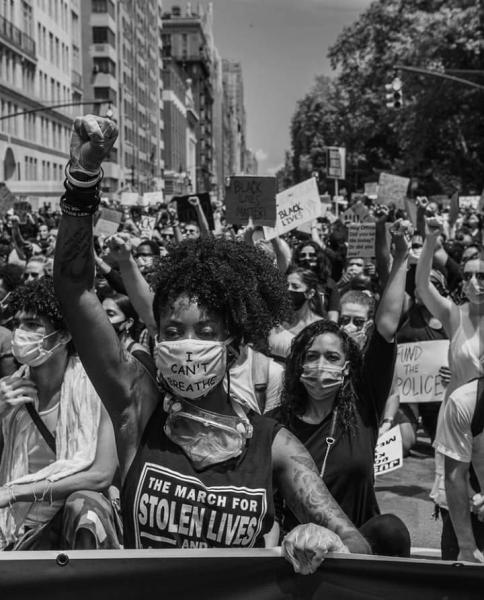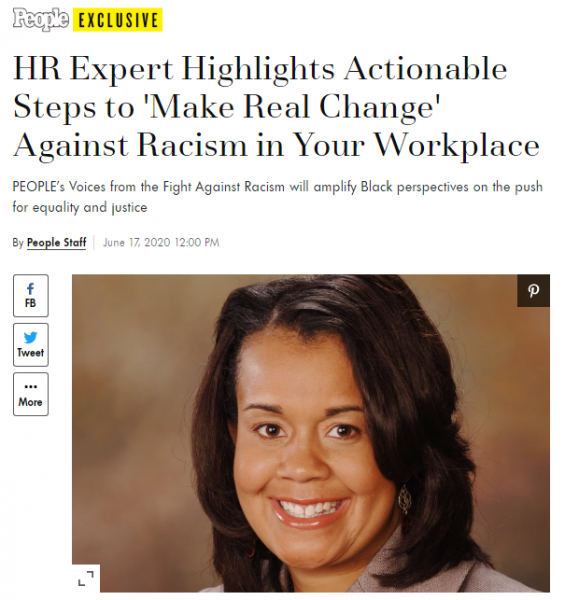
Tamara Lee worries about incremental change getting in the way of real progress. Nichelle Carpenter fears back-patting the baby steps will make it harder to complete the marathon. And Kyra Leigh Sutton wonders when employers will finally back-up their supportive tweets with meaningful improvements in policy and practice.

SMLR’s Tamara Lee leads the “March for Stolen Lives and Looted Dreams” in New York on June 6, 2020.
SMLR experts on Diversity, Equity, and Inclusion (DEI) and social justice know the hard work of defeating systemic racism in the workplace continues long after the calendar flips to March. In news interviews, essays, and opinion pieces, they explain what needs to happen to move the needle.
- Naomi R Williams laid out the broad scope of the problem in her interview with Insider, saying, “Injustice and unequal treatment in the criminal justice system, healthcare, employment, education, housing, and every institution in the nation, continue to harm Black people in the United States.”
- The pandemic has pulled back the curtain. Tamara Lee told the Future Hindsight podcast, “COVID has given us this opportunity to look at a very, very amplified way at the structures that underlie our society, and to wake us up to the idea that what we thought was secure, what we thought was fair, what we thought was an institution or a law for equal rights has not been that, either by application or intentional design.”
- Many organizations have now initiated Diversity, Equity, and Inclusion (DEI) programs and unconscious bias training in the hope of effecting change, but it requires buy-in. As Nichelle Carpenter noted in Bloomberg Law, “Employees can tell when leaders are not united in their support and advocacy for those practices. HR can really do so much to build the climate, but it does start at the top.”
- Who’s at the top matters. Kyra Leigh Sutton told PEOPLE Magazine, “It is ridiculous that we have so few Black leaders at these larger companies. People with hiring power should reflect and ask themselves, ‘What organizations and colleges are we partnering with to tap talent?’ With existing Black employees, managers should ask, ‘How are we positioning them for success, giving them the same opportunities?’”
- Creating pathways for advancement within organizations is critical. Hazel-Anne Johnson-Marcus explained to the trade publication Supermarket News, “Instead of a glass ceiling, racial and ethnic minorities experience ‘sticky floors.’ They get stuck at the first level within the organization, with little opportunity for advancement.”
- But as the pandemic wears on, just having a job remains an elusive goal for some. Sheri Davis, quoted in The Philadelphia Inquirer, said, “Historically, Black workers have been disproportionately impacted by economic crisis. The unemployment rate for African Americans typically rises faster and stays higher than any other group of workers.”

PEOPLE Magazine featured SMLR’s Kyra Leigh Sutton in its series, “Voices in the Fight Against Racism,” on June 17, 2020.
Wage inequality remains a problem, especially for Black women who, on average, earn just 62 cents for every dollar a white, non-Hispanic man earns. Davis, Johnson-Marcus, and Lee talked about the disparity during a roundtable discussion on CBS-TV in Washington.
Unions offer hope, but Lee noted problems with systemic racism in the labor movement in her op-ed published by The Star-Ledger.
SMLR’s Center for Innovation in Worker Organization, in partnership with Georgetown’s Kalmanovitz Initiative for Labor and the Working Poor, is working to change that by elevating more women—especially women of color—to leadership roles in unions. Their program, WILL Empower, is now accepting applications for its fall apprenticeships.
And for Sutton, that’s cause for optimism. She takes pride in the young people who stood up for racial equality after the police killing of George Floyd, and she hopes their energy will keep the momentum for change going long after Black History Month ends.
“The movement for racial justice gives me hope,” she said.


